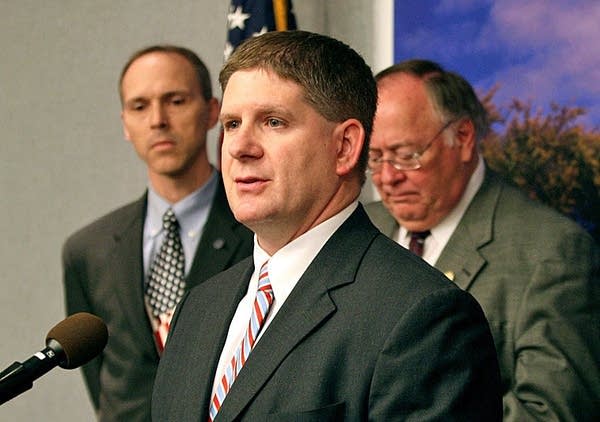GOP rejects fiscal analysis of its budget plans
Go Deeper.
Create an account or log in to save stories.
Like this?
Thanks for liking this story! We have added it to a list of your favorite stories.

A new argument over the state budget has erupted at the Capitol: Republicans and Democrats now disagree over the numbers behind the numbers.
Democrats say Republicans are rejecting nonpartisan accounting of their proposals and basing their budget plans on unproven numbers.
It takes a mutually agreed-upon set of numbers to build a state budget. Without those figures, there could be severe disagreement between the House, the Senate and Gov. Mark Dayton.
For years, the analysis by Minnesota Management and Budget in what the finance agency calls fiscal notes has been the gold standard. But now, Republicans in the House and Senate are ignoring or foregoing fiscal analysis as they put together their plan to erase the state's $5 billion budget deficit.
Turn Up Your Support
MPR News helps you turn down the noise and build shared understanding. Turn up your support for this public resource and keep trusted journalism accessible to all.
"Governors and legislators questioning fiscal notes is nothing new to this place. That's been happening since this building was built," said Republican House Speaker Kurt Zellers.
But what is different now is that Republicans in the Legislature are disregarding those fiscal notes when they don't agree with their plans.
For example, the state government finance bills count hundreds of millions of dollars in savings from consolidation, increased tax collections and collecting debts owed to Minnesota. But the fiscal notes on those items say the savings are nowhere close to what Republicans are projecting.
Zellers said, in some cases, the GOP majority doesn't trust the analysis being put forward by state agencies now controlled by the governor.
"I'm not surprised that the people who do not want to do this came back with a fiscal note that is not supportive of the cause," he said.
An argument over fiscal notes seems like minor issue at the State Capitol. But building a budget on faulty figures means lawmakers could be forced to cut additional spending or increase taxes to fix the budget next year if they're off by hundreds of millions of dollars from their projected savings.
There's one other problem, according to Minnesota Management and Budget Commissioner Jim Schowalter. He said Republicans and Dayton may not even be able to start negotiating the budget without a common set of principles. He said it's problematic for any lawmaker to discount the fiscal notes produced by his department.
"That would mean we would have plug numbers or estimates that aren't backed up without detailed analysis, and in the end I don't how we can talk back and forth about proposals without some concrete understanding of what we're all talking about," Schowalter said.
Schowalter, a political appointee who served under four governors, said there have only been a few times in his experience when lawmakers have discounted a fiscal note.
He said 14 members of his staff assemble the notes for the Legislature after working with experts in the different state agencies. He said he never sees the fiscal notes before they're released and has no say in the analysis.
Dave Jennings, a former Republican House Speaker in the 1980s, said fiscal notes have been a fact of life as long as he's been around the legislative process.
"The numbers have to come from somewhere," Jennings said. "The understanding among and between the Legislature was that they would rely on the department of finance's numbers and everybody would agree that those are the numbers we're going to use."
Democrats argue Republicans are disregarding the fiscal notes for another reason — to hide how difficult it really is to cut $5 billion out of the state budget.
DFL House Minority Leader Paul Thissen said Republicans who promised to balance the budget without raising taxes and are now finding it's not so easy.
"A live-within-our-means budget is nothing more than empty rhetoric," Thissen said. "It's as if the Republican chairs aren't even trying anymore."
Lawmakers will start debating the bills in the House and Senate next week.




